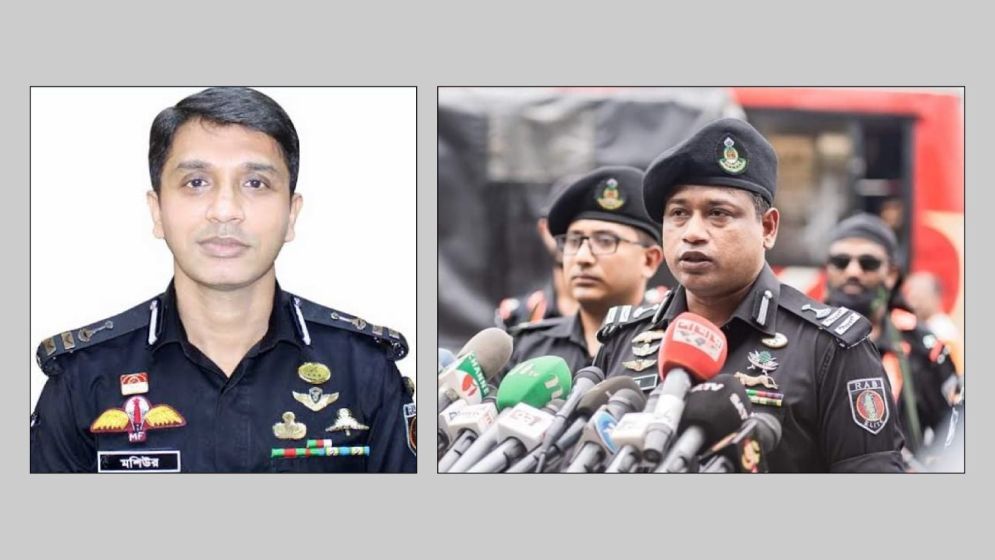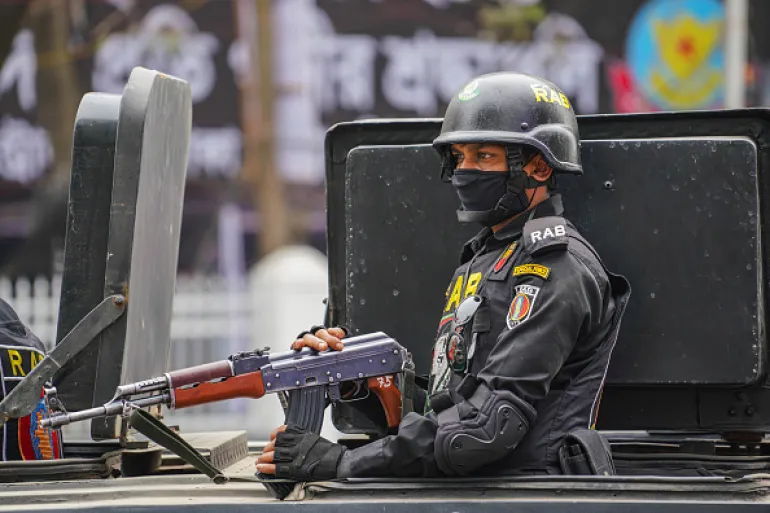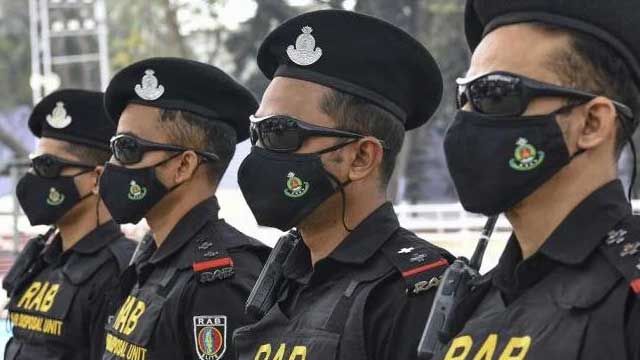Two army officers assigned to RAB were pulled from the UN peacekeeping mission at the eleventh hour

Lieutenant Colonel Mashiur Rahman Jewel and Lieutenant Colonel Mahbubul Alam. Photo: Collected
Two army officers linked to the elite Rapid Action Battalion (RAB) were recently withdrawn from the United Nations peacekeeping mission roster just before their deployment.
Bangla Outlook confirmed this information with four sources from within or formerly associated with the security forces.
These sources disclosed that the officers were initially pulled from their units to prepare for peacekeeping missions but were subsequently returned to their original posts.
One of the officers is Lieutenant Colonel Mashiur Rahman Jewel, who previously held the positions of RAB-7 commander and RAB intelligence chief.
A member of the 45th Long Course, Mashiur rejoined the military some time ago and was last assigned to Bogra Cantonment.
The second officer is the current RAB-7 commander, Lieutenant Colonel Mahbubul Alam. He and Mashiur Rahman were part of the same military training course, but Mahbubul received his commission through the 46th BMA Long Course.
Attempts were made to contact Mashiur on June 18, but he did not respond. However, Mahbubul told Bangla Outlook that it was “a routine process” and the decision was made “by the seniors."
A day earlier, Lieutenant Colonel Abu Hayder Mohammad Rasseluzzaman, the director of Inter Service Public Relations (ISPR) was contacted for comment on this but he hasn’t so far gotten back with any reply.
An official who wanted to remain anonymous revealed that while both officers were initially set to be deployed, they were later sent back to their units. The specific reasons for this change remain unclear.
The official further clarified, "I cannot confirm if they were specifically scheduled or prepared for a mission."
Bangla Outlook contacted the United Nations office in Bangladesh for their take on this but they didn’t reply back.

What might be the reasons?
According to two relevant officials, a recent decision was likely prompted by an investigative report from Deutsche Welle, a German state media outlet.
The report, a documentary aired on May 21, alleged that Bangladesh and Sri Lanka had sent officers implicated in torture and killings to participate in United Nations peacekeeping missions.
The ISPR countered the documentary on May 25, 2024, stating that the documentary titled “Why is a 'death squad' from Bangladesh allowed to go on UN missions?” presented a “misleading report” about Bangladesh army personnel involved in UN peacekeeping.
The ISPR further accused the documentary of having an ulterior motive to defame another law enforcement agency by using unrelated footage of the Bangladesh Army, thus compromising the documentary's credibility and objectivity.
The ISPR stated, "During the past three decades of peacekeeping under the United Nations, Bangladesh's peacekeepers have been free from any allegations of human rights violations, which is a testamentary achievement."
Furthermore, Dr. Hasan Mahmud, the Foreign Minister and Joint General Secretary of the Awami League, emphasized that the German broadcaster's report was "baseless and anti-national," contrasting it with the widespread praise for Bangladeshi peacekeepers from the UN Secretary-General and other international officials.
Bangla Outlook however has learned from reliable sources that the deployment of senior Bangladesh Armed Forces officials on peacekeeping missions will now be preceded by investigations to ascertain whether any credible accusations of human rights violations exist against them.
Talking with Bangla Outlook, Dr. M. Nayeem Ashfaq Chowdhury, a retired Major General, who participated in United Nations peacekeeping missions in 1994 and 2009 said that it is deeply distressing for him that “one of our military officers cannot join peacekeeping due to incompetence.”
“This is very unfortunate news for the institution and the country,” he lamented.
‘Allegations should be taken seriously’
Dr Nayeem stated that such allegations against defense officials should not be dismissed with a "brush-off" but should be thoroughly examined.
“We know that RAB operates through its own mechanism or executive magistrate's 'cover-up' or procedural follow-up. I think this review is very urgent." He said, "RAB’s activity should be reviewed now, following due procedures. They have to have a clean book," said Dr Nayeem.

The retired Major General reminded that
the success of the military operation in 2004 to arrest armed terrorists has
led to the formation of RAB in the country. However, the subsequent use of the
force has not always been used correctly, he stated.
Dr Nayeem also believes that the members of the armed forces should not be employed in policing for long periods of time. “Long-term police duty hampers their professionalism,” he said
While RAB is a specialized unit within the police force, officials from both the Ministry of Home Affairs and Police Headquarters acknowledge the Ministry's limited influence over RAB's operations.
The Ministry officials say they are not privy to detailed information regarding the movement of armed forces personnel in and out of RAB. However, they are kept informed of any assignments or transfers involving high-ranking police officers, such as those holding the position of Executive Magistrate or SP.
Human rights activist Nur Khan Liton meanwhile expressed skepticism regarding the possibility of thorough investigations into extrajudicial killings or enforced disappearances in Bangladesh allegedly conducted by forces like RAB.
Citing the lack of “independent investigative mechanisms,” Nur Khan said human rights workers like him can't even find any proper information regarding any ongoing investigations .
Nur Khan noted that international organizations are now advocating for the United Nations to implement stricter scrutiny of personnel before their involvement in peacekeeping operations.
On June 23, 2023, Amnesty International urged the United Nations to critically evaluate the recruitment of Bangladeshi law enforcement personnel for such operations, emphasizing the importance of adhering to international law.
Amnesty International's statement emphasized the need to consider the history of human rights violations by peacekeeping forces and called upon UN Secretary-General António Guterres to prioritize investigations into such violations by security forces in Bangladesh.
They stressed the importance of ensuring that individuals involved in human rights abuses are not deployed in UN peacekeeping missions.
Bangladesh has been an active participant in United Nations peacekeeping missions since 1988, starting with deployments in Iraq and Namibia. Today, it ranks as a leading contributor to UN peacekeeping efforts.
Since its initial involvement, a total of 1,885,858 Bangladeshi peacekeepers have served in 63 missions across 40 countries. Currently, Bangladesh has 7,436 uniformed peacekeepers deployed in 13 countries.
The dedication of Bangladeshi peacekeepers has come at a cost, with 167 lives lost and 259 injured in the line of duty since 1989.
—

